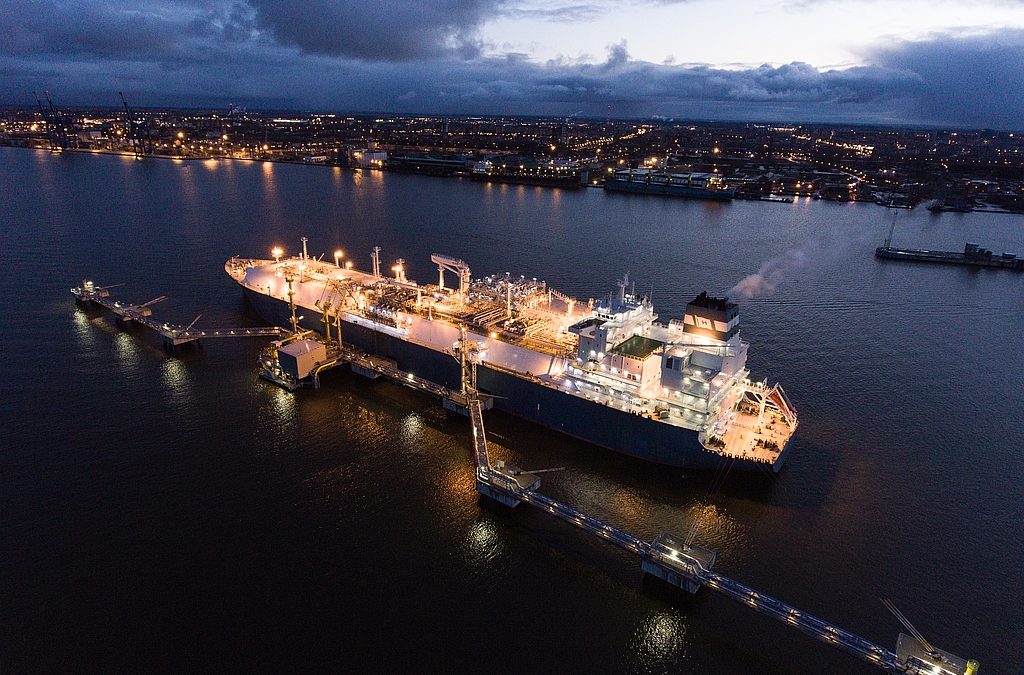Keep our news free from ads and paywalls by making a donation to support our work!

Notes from Poland is run by a small editorial team and is published by an independent, non-profit foundation that is funded through donations from our readers. We cannot do what we do without your support.
South Korea has begun work on the construction of a floating liquefied natural gas (LNG) terminal for Poland, which is expected to become operational in the Polish city of Gdańsk in 2028.
The floating storage and regasification unit (FSRU), a specialised vessel that can receive, store and regasify LNG, is expected to supply one third of Poland’s annual gas demand, according to the industry ministry.
Since Russia’s full‑scale invasion of Ukraine in February 2022, Poland has made efforts to eliminate its dependency on Russian natural gas and diversify the country’s energy mix, shifting to imports from Qatar, the US and Norway.
FSRU construction has started for good!
🚢 Yesterday, cutting of the first steel plates to build the #FSRU vessel to be permanently moored in the Gulf of Gdańsk began at the HD Hyundai Heavy Industries shipyard in Ulsan, 🇰🇷South Korea.
The FSRU will constitute the most… https://t.co/aAGq2xo649
— GAZ-SYSTEM (@GAZ_SYSTEM) July 23, 2025
Adam Bryszewski, vice-president of Poland’s state-owned gas infrastructure operator, Gaz-System, confirmed on Tuesday that work on the FSRU had commenced in the Hyundai Heavy Industries shipyard in South Korea, marking the beginning of the first phase of its construction.
Bryszewski also said that work will soon begin in Poland on the offshore part of the project – that is, dredging for the future positioning of the terminal – as well as on the construction of a new, 1.3-kilometre-long breakwater.
Meanwhile, the construction of three onshore gas pipelines (Kolnik-Gdańsk, Gardeja-Kolnik and Gustorzyn-Gardeja) which will distribute LNG from the terminal to Poland’s national gas transmission system, is expected to finish at the end of next year.
The total cost of the project, not including the ship charter fees, will be 5.3 billion zloty (€1.2 billion), Bryszewski said.
The vice-president explained that the new terminal would help Poland meet greater demand for gas, which is expected to rise from the current figure of 19 billion cubic metres (bcm) to 28 bcm in 2031. “There is quite a lot of interest in gas from Poland on the Ukrainian side,” he added.
“The FSRU construction programme will provide Poland with an additional 6.1 bcm of gas per year…equivalent to one third of the total gas supply to Poland, very flexible, from anywhere in the world,” Katarzyna Flak from the Polish industry ministry told industry news service Energetyka24.
A Canadian exploration firm says it has made "the largest oil discovery in Poland’s history and one of the largest in Europe".
The find, located in the Baltic Sea around 6km from the city of Świnoujście, also includes billions of cubic metres of gas https://t.co/2EucS0ky4E
— Notes from Poland 🇵🇱 (@notesfrompoland) July 21, 2025
Poland already imports LNG through its terminal in Świnoujście, which currently has a capacity of 8.3 bcm per year.
The country’s first LNG gas tanker, chartered by Polish state energy giant Orlen, completed its first delivery in March 2023. It was the first of eight such vessels ordered by Orlen under the former Law and Justice (PiS) government.
Orlen has also submitted a binding 15-year order for 100% of the Gdańsk FSRU terminal’s capacity.

Notes from Poland is run by a small editorial team and published by an independent, non-profit foundation that is funded through donations from our readers. We cannot do what we do without your support.
Main image credit: AB Klaipėdos Nafta/Wikimedia Commons (under CC BY-SA 4.0)

Agata Pyka is a former assistant editor at Notes from Poland. She specialises in Central and Eastern European affairs, cybersecurity, and investigative reporting. She holds a master’s degree in political communication from the University of Amsterdam, and her work has appeared in Euractiv, the Balkan Investigative Reporting Network (BIRN), and The European Correspondent, among others.



















